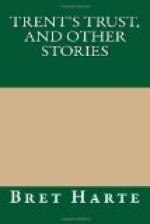The girl looked up with astounded eyes, which in the capriciousness of her passionate nature the next moment filled with tears. Then dropping on her knees she caught the master’s bitten hand and covered it with tears and kisses. But he quietly disengaged it and lifted her to her seat. There was a sniffling sound among the benches, which, however, quickly subsided as he glanced around the room, and the incident ended.
Regularly thereafter she took her prayer book back at recess and disappeared with the children, finding, as he afterwards learned, a seat under a secluded buckeye tree, where she was not disturbed by them until her orisons were concluded. The children must have remained loyal to some command of hers, for the incident and this custom were never told out of school, and the master did not consider it his duty to inform Mr. or Mrs. Hoover. If the child could recognize some check—even if it were deemed by some a superstitious one—over her capricious and precocious nature, why should he interfere?
One day at recess he presently became conscious of the ceasing of those small voices in the woods around the schoolhouse, which were always as familiar and pleasant to him in his seclusion as the song of their playfellows—the birds themselves. The continued silence at last awakened his concern and curiosity. He had seldom intruded upon or participated in their games or amusements, remembering when a boy himself the heavy incompatibility of the best intentioned adult intruder to even the most hypocritically polite child at such a moment. A sense of duty, however, impelled him to step beyond the schoolhouse, where to his astonishment he found the adjacent woods empty and soundless. He was relieved, however, after penetrating its recesses, to hear the distant sound of small applause and the unmistakable choking gasps of Johnny Stidger’s pocket accordion. Following the sound he came at last upon a little hollow among the sycamores, where the children were disposed in a ring, in the centre of which, with a handkerchief in each hand, Concha the melancholy!—Concha the devout!—was dancing that most extravagant feat of the fandango—the audacious sembicuaca!
Yet, in spite of her rude and uncertain accompaniment, she was dancing it with a grace, precision, and lightness that was wonderful; in spite of its doubtful poses and seductive languors she was dancing it with the artless gayety and innocence—perhaps from the suggestion of her tiny figure—of a mere child among an audience of children. Dancing it alone she assumed the parts of the man and woman; advancing, retreating, coquetting, rejecting, coyly bewitching, and at last yielding as lightly and as immaterially as the flickering shadows that fell upon them from the waving trees overhead. The master was fascinated yet troubled. What if there had been older spectators? Would the parents take the performance as innocently as the performer and her little audience? He thought it necessary later to suggest this delicately to the child. Her temper rose, her eyes flashed.




